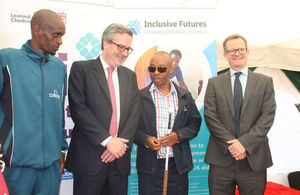UK government launches programmes to support Kenyans with disabilities access employment opportunities
High Commissioner to Kenya, Nic Hailey, launched the two UK-funded programmes marking milestones achieved since last year's Global Disability Summit.

The British High Commissioner to Kenya, Nic Hailey, today launched two UK-funded programmes that will support persons with disabilities access employment opportunities. The two programmes, the Innovation to Inclusion (i2i) programme and The Inclusion Works! Programme will help break down the barriers that have curtailed access to various opportunities for persons with disabilities.
Innovation to Inclusion (i2i) will ensure women and men with disabilities are actively engaged and retained in meaningful private sector work by developing, testing, validating, and sharing learnings from interventions that aim to directly improve access to waged employment.
The Inclusion Works! programme aims to increase disability inclusion in formal employment, across all sectors. It will work directly with prospective employers to demonstrate ways to include people with disabilities in the workplace on an equal basis with others.
Speaking at the event, British High Commissioner Mr Nic Hailey said:
These new programmes will support more people with disabilities into employment, and will help more employers access a new pool of talent for their business.
Disability inclusion makes economic sense; these programmes will help ensure that the gains from economic development and private sector activity benefit many, and do not leave anyone behind.
SightSavers Country Director, Elizabeth Oyugi said:
Inclusion Works intends to work in partnership with more than 100 employers across four countries including Kenya. It will test new practices that are compliant with UN disability rights protocols and Kenya’s own Disability Act 2003 that reserves 5% of all private sectors to persons with disabilities. The programme is designed to include people of a wide range of disabilities, including blind-deafness and intellectual disabilities.
Leonard Cheshire Spokesperson said:
Programmes like i2i are essential in bringing together expertise from a diverse group of contributors, who all offer a unique and insightful perspective on the challenges people with disabilities face all over the world. Equal access to decent employment is an absolute necessity for people with disabilities and it’s important that we work together to develop frameworks that can be implemented in low and middle-income countries in order to affect change and create more inclusive societies.
The two programmes were launched in the margins of an event to mark the milestones achieved since last year’s Global Disability Summit. During today’s event, which brought together disability inclusion stakeholders, participants shared information on progress made in implementing commitments from the Summit, and celebrated achievements on disability inclusion.
The Global Disability Summit, which was co-hosted last year by the British and Kenyan Governments, and the International Disability Alliance, sought to address the fact that people with disabilities have been left behind in all development efforts. The summit sought to establish processes and partnerships which will address this inequality and create lasting change for persons with disabilities. As a result, over 170 governments, civil society, private sector and multilateral organisations made global and national commitments on disability inclusion at the Summit.